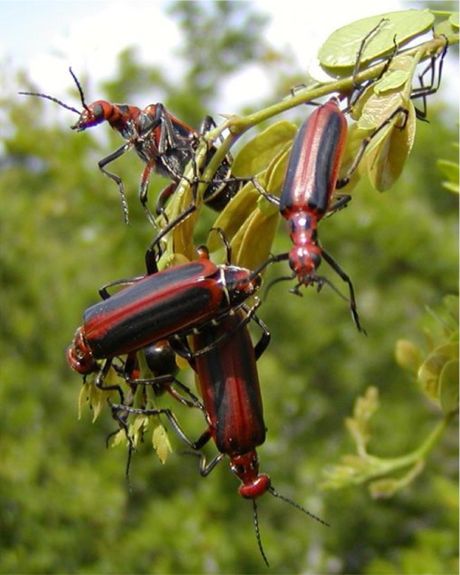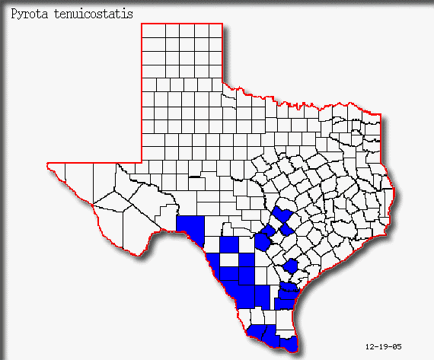
|
Return to Texas Entomology - Compiled by Mike Quinn
cf. P. insulata, P. palpalis

|
Then we looked up and saw literally clouds of these beetles
flying through the air and aggregating on trees in the area.
I would say that there were 10,000 or more individuals in an area of a couple of
acres.

|
County Record Source: E.G. Riley, Dec. 2005
Range: Central Texas south to Mexico (Blackwelder, 1946).
Biology:
Adults emerge in late May and June and feed on leaves but are especially attracted to flowers where they feed on nectar and pollen. They gather in groups, so large numbers can occur in concentrated clusters in a field.
Similar Species:
There are 40 species of Pyrota restricted to the New World, about 30 in Nearctic.
Texas Taxa:
Pyrota akhurstiana Horn
Pyrota bilineata Horn
Pyrota concinna Casey
Pyrota deceptiva Selander
Pyrota discoidea LeConte
Pyrota fasciata Selander
Pyrota insulata (LeConte)
Pyrota invita Horn
Pyrota lineata texana Dillon
Pyrota mylabrina Chevrolat
Pyrota palpalis Champion
Pyrota perversa Dillon
Pyrota plagiata (Haag-Rutenberg)
Pyrota postica LeConte
Pyrota punctata Casey
Pyrota riherdi Dillon
Pyrota tenuicostatis (Dugès)
Pyrota victoria Dillon
Weblinks:
Blister Beetles - Bart Drees & John Jackman, 1999.
Blister Beetles - Chris Sansone & Allen Knutson, 2002.
Blister Beetles - Featured Creatures - Richard B. Selander & Thomas R. Fasulo, 2003.
Etymology: Pyrota tenuicostatis (Dugès, 1869)
pyro, (G). Fire; wheat
tenu, -i (L). Thin, slender
cost, =a (L). A rib
Biology: Eugenio Dugès (1826-1895) - Mexican entomologist of French origin. Namesake of entomological journal, Dugeusiana.
References:
Arnett, R.H., Jr., M.C. Thomas, P.E. Skelley & J.H. Frank. (editors). 2002. American Beetles, Volume II: Polyphaga: Scarabaeoidea through Curculionoidea. CRC Press. 861 pp.
Blackwelder, R.E., 1946. Checklist of the Coleopterous insects of Mexico, Central America, the West Indies, and South America, part 4. Smithsonian Institution US Natural History Museum Bulletin 185, Parts 1-6. 1492 pp.
Borror, D.J. 1960. Dictionary of Word Roots and Combining Forms. National Press Books, Palo Alto. v + 134 pp.
Brown, W.D., R. Standford. 1992. Male mating tactics in a blister beetle (Coleoptera: Meloidae) vary with female quality. Canadian Journal of Zoology 70:1652–1655.
Champion, G.C. 1889-1893. Insecta. Coleoptera. Heteromera (part). In: F.D. Godman & O. Salvin (editors). Biologia Centrali-Americana: or, contributions to the knowledge of the fauna and flora of Mexico and Central America. Taylor & Francis, London. 4(2): x + 494 pp., Tab. 20
Dillon, L.S. 1952. The Meloidae (Coleoptera) of Texas. American Midland Naturalist, 48(2): 330-420.
Drees, B.M. & J. Jackman. 1999. Field Guide to Texas Insects. Taylor Trade Publishing, Lanham, MD. 376 pp.
Pinto, J.D. & M.A. Bologna. 1999. The New World genera of Meloidae (Coleoptera): a key and synopsis. Journal of Natural History 33: 569-620.
Selander, R.B. 1983. A revision of the genus Pyrota. IV. The Tenuicostatis group (Coleoptera, Meloidae). Journal of the Kansas Entomological Society. 56 (1): 1-19.
White. R.E. 1983. A Field Guide to the Beetles of North America. Houghton Mifflin Company, Boston. 368 pp.
Zaragoza C., S. 1999. Eugenio Dugés: un precursor de la entomología en México. Dugesiana 6: 1-26.
14 Jun 2008 © Mike Quinn / mike.quinn@tpwd.state.tx.us / Texas Entomology / Texas Beetle Information